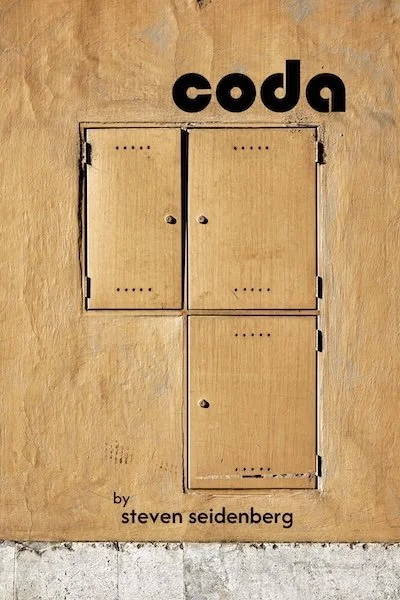Available:
Omnidawn Publishing
Amazon
Audiobooks:
Spotify
SoundCloud
Audible
Apple Podcasts
Coda
The nameless narrator of Steven Seidenberg's latest work, Coda, attempts to trace the origins of linguistic and perceptual differentiation—of experience through the cipher of the subject, broadly understood—by advancing the linguistic experiments of contemporary lyric and narrative forms, moving between extravagant prosody and obsessive disquisition to reconfigure the conceptual imperatives common to many throughlines in philosophy and theology. Continuing the focus on the structure of memory and the decadence of body he began in his book Anon, Seidenberg here describes the epistemological regress of desire, intention, knowledge, and discernment, coupling the language and concerns of authors as diverse as Spinoza, Kant, Hegel, and Wittgenstein with a raucous humor in the tradition of Rabelais, Beckett, Lispector, and Sterne.
Praise
An unnamed narrator, possibly afloat, adrift, possibly asleep, or dreaming, or already dead, or as good as, being an exile, or a condemned fool on a ship of fools, takes the opportunity of this voyage of sorts, to try and make sense of their life and mental state. Through a dizzying, meandering syntax, and farcical flourish, the adventure takes us through philosophical events with dogs, how to tell one’s tale, plead one’s case, how to walk through doors, lose one’s limbs, if not one’s mind, how to make a liveable self in the world, while puffing out smokes of language to fight off the existential crisis at play: “I am waiting for something to wait for”. It might take a little while to adjust to this spinning language feast, adapted from bygone literary models, from Rabelais to Sterne, but once you’re in, you will find yourself unable to put down the addictive, comical and strangely urgent twists and turns of Seidenberg’s latest proposition.
—Caroline Bergvall, author of Drift, Alisoun Sings, and Meddle English
This is a philosophical meditation on sensation, being, and discontentment, on the ways that the “flesh is rent in twain by such a biding paragon of super fluent longings.” What purpose has a “depthless whorl of poesy” to what is lost, to what is left behind? There is a music in the intriguing sonic interrogation/investigation of thought and its forms and formal restraints. To enter Seidenberg’s text is to confront the impossibilities of holding all of being’s and sensation’s and experience’s complexities in a single phrase or word or line of thought. There remains only the trace elements of experience that we are just able to sense in the linguistic constellations Seidenberg constructs. Relational possibilities are activated through a remarkable linguistic acuity. This is a tracking of thought, of the possibilities of thought across time, of the limitations of knowing, of the “integral abyss” of the self. It is a marvelous wonder. Fall in. Fall headlong in.
—Tonya M. Foster, Poet, George & Judy Marcus Endowed Chair in Poetry at San Francisco State University
In his captivating Coda, Steven Seidenberg combines philosophy, narrative, and poetry to grapple with the ontological basis of perceptual multiplicity, the universal posture of a subjectivity unanchored in substance. Readers of Coda encounter an “I” struggling against a sea of recollections, but neither in the mode of a heroic odyssey that sets its teleology on a mythic home, nor a mystical union with the One, guided by a leeward yearning for autobiographical shores. The sea is here a figure of travail and a motion that wrests the writer from stable “ground” to an epistemological cataract, a compulsive skirr towards being that is at once a glimmer of disclosure and a final obfuscation—“ the last place, the final placement, the spent world in tranquility and rancor”, a dream we call place. Coda is ultimately a story of beginnings without origin, and endings that digress beyond all possible conclusion; in ecstatic derivation and surrender to this paradox at the center of all psychological and philosophical resolve, Seidenberg has created a genre-defying work that transfigures the pre-modern forms of fable, treatise, panegyric, and novel, into something entirely new, a tragic/comic mashup that extends beyond description.
—Tarek Elhaik, Professor of Anthropology, University of California, Davis, author of Anthropology and Aesthetics: Cogitations and The Incurable Image
